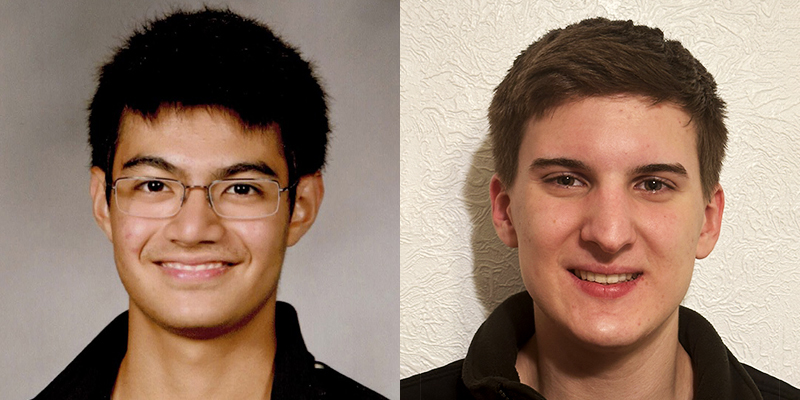From sustainable cements to climate adaptation, Andlinger Center supports 34 undergraduate internships
Underscoring its commitment to supporting the next generation of energy leaders, the Andlinger Center has awarded funds to 34 undergraduate students to work on 25 disparate energy and environmental internship projects. The internships provide students with opportunities to participate in original research in collaboration with Princeton faculty or partner non-profit organizations, with topics spanning from fusion energy and low-carbon cements to clean energy policy analysis and sustainable behavior change.
The Andlinger Center’s student internship program is supported by The Sustainability Fund, the Peter B. Lewis Fund for Student Innovation in Energy and the Environment and the Dede T. Bartlett P03 Fund for Student Research in Energy and the Environment. The program is also supported by Learning and Education in Service (LENS), a Princeton University initiative to expand access for undergraduates to summer internships in service and social impact.
The students’ projects are described briefly below:
Internships with Princeton faculty:
Malik Resheidat (CBE ’27) and Marko Alimpijevic (CBE ’28)
Bioengineering for Renewable Energy and the Environment
Advised by José Avalos
The interns will assist in one of several potential research projects on microbial, metabolic, and protein engineering for the sustainable production of fuels and chemicals. There are also potential projects that seek to use bioengineering tools for environmental remediation applications, such as the degradation of PFAS or heavy metals removal. The interns will learn modern techniques in molecular biology, genetic engineering, microbial cultivation, protein expression, fermentation, instrumental analysis, and other skills in biotechnology.
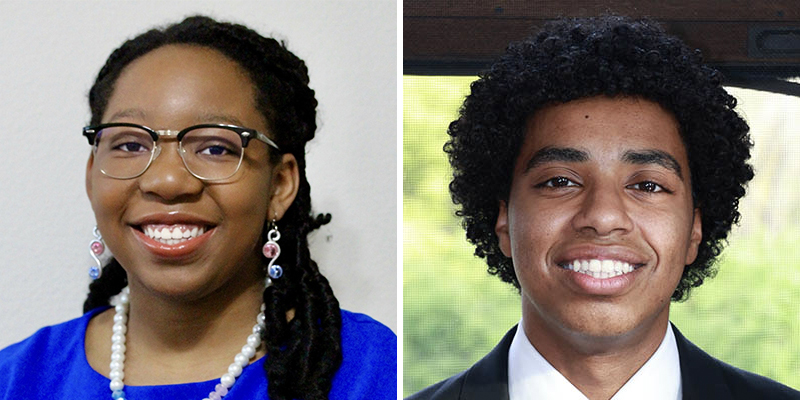 Peggy Carr (ECE ’28) and Kareem Mohamed (ECE ’28)
Peggy Carr (ECE ’28) and Kareem Mohamed (ECE ’28)
Designed Meta-surfaces for Electronic and Photonic Structures
Advised by Claire Gmachl
In this project, interns will explore engineered surfaces and materials and their applications to mid-infrared sensing systems, which enable the precise detection and analysis of greenhouse gases and other environmentally significant gases. The interns might also work to develop coatings from these engineered materials for use in radiative cooling and other energy applications. The interns will assist in the design, fabrication, and development of these engineered meta-surfaces.
 Kyle Gschwend (CEE ’26), Machua Muchugia (MAE ’28), and Theodore Ouyang (ORF ’28)
Kyle Gschwend (CEE ’26), Machua Muchugia (MAE ’28), and Theodore Ouyang (ORF ’28)
Understanding Incentives for Private Sector Investments in Climate Change Adaptation
Advised by Chris Greig and Richard Moss
This internship involves qualitative and quantitative research into the factors influencing private companies to invest in climate change adaptation. The interns will work to understand the barriers to private investment in climate adaptation, potential policy solutions to attract investment in adaptation, sectors in which adaptation could complement existing business models, and analytical methods for evaluating the risks and returns of adaptation investments. Drawing from a literature review, the interns will work to produce a report and pilot application of employing quantitative methods to evaluate investment returns on climate adaptation.
 Adam Moussa (CHM ’28)
Adam Moussa (CHM ’28)
Understanding Incentives for Private Sector Investments in Climate Change Adaptation
Advised by Chris Greig and Richard Moss
This internship involves qualitative and quantitative research into drivers of private company investments to make infrastructure more climate resilient. The internship will explore drivers preventing companies from investing in infrastructure resilience, policies would attract investment, and business models to encourage investment. The internship will develop financial analysis methods that better reflect the cost of climate impacts and the value of investments in strengthening infrastructure resilience. The project will include literature review of journal articles and reports on private sector investment in strengthening infrastructure resilience, potential adaptation technologies, supply costs, and analytical methods. The products of the internship will be a report and pilot application of quantitative methods for evaluating adaptation investment returns.
 Darren Milman (SPIA ’27)
Darren Milman (SPIA ’27)
Net-Zero Infrastructure at the Speed of Trust
Advised by Chris Greig and Elke Weber
This project will contribute to Princeton’s Net-Zero Infrastructure at the Speed of Trust project, which explores the role of trust in driving faster development and delivery of clean energy and industrial decarbonization infrastructure. The work will characterize a broad range of trust relationships between a wide range of stakeholders, including energy companies, project developers, engineering, procurement, and construction contractors, consulting firms, equipment and material suppliers, landowners and communities, NGOs, labor organizations, financiers, educators, regulators, and policymakers. The intern will work with postdoctoral researchers to develop a conceptual framework for the new ethical infrastructure and test its appeal, drawbacks, and potential enhancements with relevant stakeholders. The internship will result in a report that includes recommendations for the Infrastructure of Trust framework.
 Kéllia Gatete (MAE ’26) and Imani Kegode (MAE ’28)
Kéllia Gatete (MAE ’26) and Imani Kegode (MAE ’28)
Electrochemical Plasma Catalytic Conversion of CO2 to Methanol
Advised by Yiguang Ju
Methanol is a simple alcohol that plays an important role as a building block for a variety of important chemicals, yet the dominant method for industrially producing methanol requires the reaction to be carried out at high temperatures and pressures. In this project, the interns will work to develop a novel approach for methanol synthesis using plasma as a catalyst, which could enable the conversion of CO2 and water to methanol at room temperature and pressure. The interns will assist the members of the research team as they develop an electrochemical and plasma catalytic reactor, aiding in the experimental design and characterization of the reaction.
 Reva Kumar (ECE ’28)
Reva Kumar (ECE ’28)
Temperature and Concentration Dependance of Anion Partitioning in Ion Exchange Membranes
Advised by Ryan Kingsbury
Water desalination technology is increasingly essential to address growing freshwater scarcity associated with climate change, industrialization, and population growth. Electrically driven, membrane-based desalination processes are energy efficient and compact, yet their ability to selectively remove specific contaminants such as arsenic or nitrate is limited by the selectivity performance of the membrane, which is difficult to predict when the membrane is in contact with natural waters that contain many dissolved species. In this project, the intern will investigate how anions from different mixtures sorb (or partition) onto ion exchange membranes at different temperatures and concentrations. This data could be used to evaluate the kinetic and thermodynamic aspects of the partitioning process, with the goal of being able to predict the membranes’ selectivity performance.
 Tam Nguyen (MAE ’27)
Tam Nguyen (MAE ’27)
Liquid Metal Research, Design, and Development
Advised by Egemen Kolemen
Liquid metals show promise for their potential to handle heat loads in nuclear fusion applications. The Plasma Control Group is working on the Liquid Metal eXperiment Upgrade (LMX-U), a liquid metal loop device capable of free-surface liquid metal flow within a magnetic field. The working fluid of LMX-U is Galinstan (an alloy of gallium, indium, and tin), a liquid metal at room temperature. The interns will design upgrades and assist in the experiments on the LMX-U. Specific projects may include utilizing diagnostics such as Ultrasound Doppler Velocimetry to measure velocities within the flow and assisting with liquid metal experiments and 3-D fluid simulations.
 Griffin Hon (ORF ’28)
Griffin Hon (ORF ’28)
Optimizing Fusion Reactors with a Data-based Approach
Advised by Egemen Kolemen
One of the leading fusion reactor designs is a stellarator, which resembles a twisted, 3-D torus that uses magnetic fields to confine plasmas. To create commercially viable fusion power, stellarators must be capable of confining plasma long enough for fusion reactions to occur while meeting other physics, design, and cost requirements. The Plasma Control Group has developed a stellarator equilibrium and optimization code known as DESC to create a database of over 100,000 possible stellarator designs. The intern will apply statistical and/or machine learning techniques to analyze this large database with the aim of discovering more optimal fusion reactor designs.
 Ariane Adcroft (MAE ’26)
Ariane Adcroft (MAE ’26)
CHAOS Lab Building Energy Management
Advised by Forrest Meggers
The intern will support cutting-edge research in building energy management. The student will work closely with graduate researchers to advance an open technology stack for monitoring and controlling building systems in both laboratory and campus-wide settings. The student’s primary project will involve designing, developing, and constructing a demonstration apparatus that integrates sensors and actuators for delivering heating and cooling through both hydronic and air-based means. In addition to hands-on work with hardware and systems integration, the student will actively contribute to ongoing and emerging research initiatives within the lab.
 Jessica Guo (CEE ’27)
Jessica Guo (CEE ’27)
An Empirical Analysis of Global Climate Policy Adoption
Advised by Wei Peng and Manuel Linsenmeier
There is growing evidence that some types of climate policies, such as subsidies to promote clean energy adoption, can enable or support the subsequent adoption of other policies like carbon pricing. The adoption of climate policy in leading countries and regions may also encourage others to follow suit. Drawing from recently published global datasets on climate policy adoption, this project aims to deepen the empirical understanding of policy sequencing within major countries and policy diffusion across countries. The intern will work to develop an empirically grounded framework to help predict policy choice and adoption. These empirical relationships will then be incorporated into a multi-sector, multi-regional global integrated assessment model for forward-looking scenario analysis.
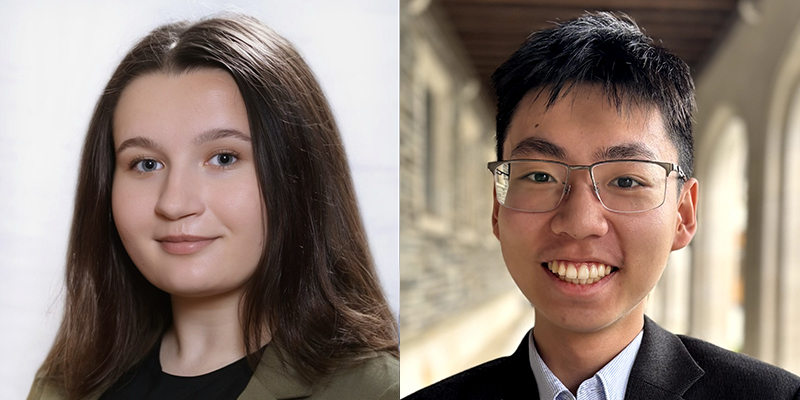 Marta Rzeszutko (ECE ’26) and Anthony Shen (CBE ’28)
Marta Rzeszutko (ECE ’26) and Anthony Shen (CBE ’28)
Molecular Epitaxy of Organic Semiconductors
Advised by Barry Rand
The success of inorganic semiconductors, particularly silicon, stems from a deep understanding of their crystallization and epitaxial growth, in which crystals are grown on a pre-existing crystalline template. Despite the achievements of OLEDs, the crystallization of organic semiconductor (OSC) thin films and their epitaxy remains largely unexplored. In this project, the interns will investigate various OSC thin films to understand the factors governing their crystallization behavior. The interns will also examine the epitaxial growth of OSCs to assess their structural tolerance and compatibility with other crystals. By understanding the factors dictating the crystallization and growth of OSCs, the project could help unlock high-performance organic electronics.
 Kyle Abello (CEE ’28)
Kyle Abello (CEE ’28)
Quantifying Greenhouse Gas Emissions from Water Resource Recovery Facilities via Survey
Advised by Z. Jason Ren
Water resource recovery facilities (WRRFs) are significant yet often overlooked greenhouse gas emitters. Using a database of responses to a survey on emissions from WRRFs, the intern on this project will construct interview guides for follow-up conversations with WRRF operators, develop spreadsheets for data collection, attend interviews to take notes, document data, and ensure that all desired data points are collected.
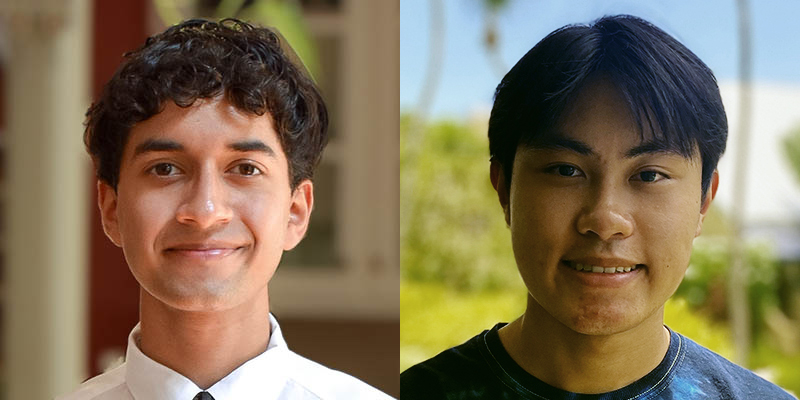 Rishi Subramanian (ECE ’28) and Justin Tam (CHM ’27)
Rishi Subramanian (ECE ’28) and Justin Tam (CHM ’27)
Sustainable Conversion of Hydrocarbons on Porous Catalytic Materials
Advised by Michele Sarazen
While catalysts are ubiquitous in the production of fuels and are important intermediates for chemicals, consumer goods, and pharmaceuticals, the design of advanced catalysts that possess high reactivity, selectivity, and stability remains paramount to efficiently and sustainably meeting growing demands. Porous crystalline materials such as zeolites and metal-organic frameworks are a class of materials that offer a large and diverse pool of catalysts and catalyst supports. This project strives to elucidate how important catalytic properties affect reactivity, selectivity and stability. The intern will work to control these properties via advanced synthesis strategies, which are vital for the optimization and potential industrial application of our materials and processes.
 Kirill Sirik (ORF ’27)
Kirill Sirik (ORF ’27)
AI Electrification Demand vs. Decarbonization Targets
Advised by Ronnie Sircar
The rise of AI and its associated energy demand could present serious headwinds to overarching climate goals. This project will investigate how new energy demand from AI will impact decarbonization targets for electricity production in the United States. The intern will build from research conducted by the ORFEUS project at Princeton to investigate topics related to how the energy sector will respond to the rising demands of AI, including the role of renewables and battery storage and the potential role of nuclear energy as a backstop technology.
 Ana Bendesky (MAE ’28)
Ana Bendesky (MAE ’28)
Quantifying Evaporative Transport Towards Improved Mineral Extraction
Advised by Howard Stone and Fernando Temprano-Coleto
As the clean energy transition unfolds, global demand of lithium is expected to increase 20-fold by 2050. Lithium is primarily extracted from geologic brines, which are pumped into open-air ponds where water evaporates, gradually concentrating all solutes. While evaporation is an inexpensive process, evaporation ponds are both slow-acting and land-intensive. To improve evaporative lithium extraction, it is important to better understand processes like the transport of dissolved minerals, brine fluid dynamics, and the transfer of heat and water vapor. This project will investigate these fundamental transport processes using benchtop experiments and microfluidics. The intern will build microscopic channels as wide as a human hair and observe the concentration and crystallization of minerals in-situ using microscopy. The resulting insights will be used to develop models for the concentration and extraction of minerals like lithium, as well as to explore pathways for their optimization.
 Connor Roeser (MAE ’28)
Connor Roeser (MAE ’28)
Marangoni Spreading of Surfactants and Its Environmental Implications
Advised by Howard Stone and Fernando Temprano-Coleto
When surfactants — substances that spontaneously adsorb onto the interfaces between fluids — are locally deposited on the surface of water, they induce Marangoni forces that trigger an outward spreading motion. Surfactant spreading plays a key role in oil spills, the onset of ocean waves, and the formation of sea aerosols. In this project, the intern will investigate Marangoni spreading in viscous fluids using benchtop experiments and advanced imaging techniques. They will build controlled setups in which surfactants will be deposited onto fluids of varying properties and measure the resulting motion. The intern will characterize the fundamental fluid dynamics behind Marangoni spreading and evaluate their implications for relevant environmental processes.
 Carina Fucich (CEE ’28)
Carina Fucich (CEE ’28)
Durable, Sustainable Cements
Advised by Claire White
The implementation of novel cement materials in the construction industry is hindered by the lack of long-term performance data predicting their durability. In this project, the intern will perform experiments to determine the long-term performance of low-carbon dioxide cements by studying their underlying chemical mechanisms. Experimental techniques that may be employed include X-ray diffraction, scanning and transmission electron microscopy, and Fourier-transform infrared spectroscopy.
 Najatene Saunders (CBE ’27) and Joseph Sherrod (CHM ’28)
Najatene Saunders (CBE ’27) and Joseph Sherrod (CHM ’28)
Plastic-Degrading Enzymes
Advised by A. James Link
Plastic pollution continues to be a major environmental problem. One of many possible solutions to this problem involves using either whole cell biocatalysts or purified enzymes to break down plastics into useful feedstock chemicals that can be used to displace petrochemical sources. This project will focus on the expression and purification of plastic-degrading enzymes from various sources. The interns will gain experience in recombinant DNA manipulations as well as protein purification and characterization and enzyme assays.
 Edward Deleu (ECE ’26)
Edward Deleu (ECE ’26)
Synthesizing and Exploring the Electronic Properties of Van der Waals Heterostructures
Advised by Saien Xie
Transition metal dichalcogenide (TMD) heterostructures are compounds with a wide range of promising applications, from electronics to energy storage. In this project, the intern will work to tune the electronic properties of these heterostructures to improve their performance and potentially enable applications in devices such as 2D transistors. The intern will also explore new fabrication techniques for creating multi-layer TMD heterostructures.
 Abigail Cheng (CEE ’27)
Abigail Cheng (CEE ’27)
Systematic Assessment of Fuel Production and Chemical Industry Decarbonization in Net-zero Energy Systems
Advised by Dharik Mallapragada
While modeled pathways for energy system decarbonization by mid-century broadly emphasize decarbonizing the electricity supply and prioritizing end-use electrification, electrification remains challenging for many industrial and transportation applications. These areas will require alternative strategies such as the adoption of hydrogen, the deployment of carbon capture technologies, and the production and use of low-carbon fuels. However, the energy needs and available technologies for many industrial end-uses are not well-characterized in energy systems models compared to the power sector, which limits the ability of researchers to fully analyze all net-zero energy scenarios. In this project, the intern will develop granular yet computationally tractable representations of technology options for industrial decarbonization as well as low-carbon liquid fuel production for use in macro-energy systems models.
Internships with non-profit organizations:
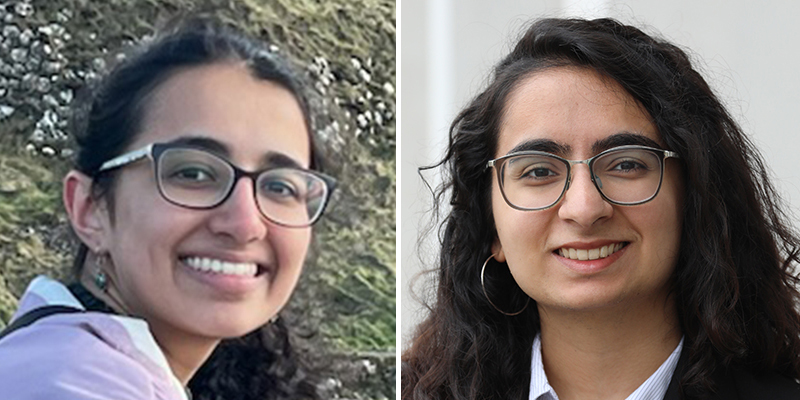 Ria Tomar (EEB ’27) and Aarushi Adlakha (PSY ’26)
Ria Tomar (EEB ’27) and Aarushi Adlakha (PSY ’26)
Industrial Decision- Making and Behavior Research
American Council for an Energy-Efficient Economy (ACEEE)
Business and industry are critical greenhouse gas emitters and will play a key role in climate change mitigation. In a time when federal policy is loosened, voluntary action by industries will become even more important. The ACEEE Behavior, Health, and Human Dimensions Program conducts research on industrial decision-making and how industries can be encouraged to act on climate change. In 2025, the program will research and provide assistance to professionals on behavior change that encourages energy efficiency and climate action across all economic sectors. As part of this effort, the interns on this project will assist with literature reviews, behavioral science advising, interviews with business leaders, and other research activities.
 Julia Young (ECE ’27)
Julia Young (ECE ’27)
Energy Transition Team Intern
Environmental Defense Fund (EDF)
The goal of EDF’s Energy Transition Team is to bend the curve on global greenhouse gas emissions from fossil fuel production and use by 2030, cleanly and equitably. In formulating and achieving EDF’s strategies, the Energy Transition Team will work in close collaboration with EDF regions, draw on cutting-edge science and rigorous economic and financial analysis, and act on principles of diversity, equity, and inclusion to develop durable solutions. In this project, the intern will work in the clean energy group within the Energy Transition Team, with a focus on California’s role in decarbonizing the power system. The intern will support regulatory and legislative advocacy for clean energy procurement, transmission reform, and market rule development for offshore wind and other clean energy resources.
 Mira Eashwaran (SPI ’26)
Mira Eashwaran (SPI ’26)
Global Engagement and Partnerships Intern
Environmental Defense Fund (EDF)
EDF’s Global Engagement and Partnerships (GEP) team facilitates EDF’s global presence, advocacy, and policy work, while also building strong relationships with stakeholders worldwide. The GEP team coordinates EDF’s engagement in international fora like the United Nations Framework Convention on Climate Change (UNFCCC) and serves as an institution-level coordinator for EDF’s partnerships with key multilateral stakeholders. The intern will support EDF’s GEP team on research, writing, and advocacy projects focused on international climate negotiations and global environmental governance. The intern will also support the development and administration of strategic partnerships with key stakeholders.
 Cynthia Jacobson (CEE ’26)
Cynthia Jacobson (CEE ’26)
Utility Advisor Research Intern
Moonshot Missions
Moonshot Missions is a non-profit organization working to help communities and utilities secure affordable access to clean water. In this project, the intern will serve as a technical and research resource for Moonshot Mission, working in support of the organization’s research team. The intern will apply research and knowledge to address contemporary challenges facing drinking water and wastewater utilities, particularly in economically distressed communities.
